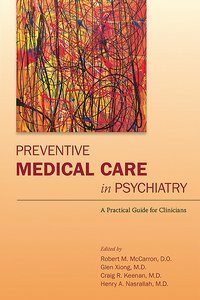Preventive Medical Care in Psychiatry
A Practical Guide for Clinicians
View Pricing
Description
Preventive Medical Care in Psychiatry: A Practical Guide for Clinicians was written for psychiatrists in training and in clinical practice, as well as other health care providers who wish to learn an evidence-based and user-friendly approach to prevent commonly encountered, treatable, and potentially deadly illnesses in their patients. The poor health and early mortality of people with serious mental illnesses has been well documented: People who have serious mental illness have increased general medical comorbid conditions, receive minimal preventive medical services, and have a reduced life span of as much as thirty years when compared to the general population. In addition, there is now extensive data showing bidirectional interactions between chronic medical illnesses and mental disorders. Clearly, treating the whole person, instead of the disorder in isolation, is critical to improving outcomes and reducing suffering.
The book's logical structure makes it easy to use, with sections devoted to general principles of preventive psychiatry, cardiovascular and pulmonary disorders, endocrine and metabolic disorders, infections disorders, and oncologic disorders. In addition, the volume:
- Provides evidence-based approaches to care across the prevention spectrum, from primary prevention (how to keep people healthy), to secondary prevention (how to detect early signs of common illnesses), through tertiary prevention (how to prevent disability and adverse outcomes once patients develop medical problems).
- Informs clinicians about how to more effectively interface with general medical practitioners, and instructs them in providing screening for common medical problems, as well as ensuring that preventive measures, such as vaccinations, are performed.
- Covers, in a section addressing special topics, child, adolescent, and geriatric populations, as well as strategies for assessing and managing chronic pain.
- Concludes with an appendix that features a health questionnaire, Preventive Medicine in Psychiatry (PMAP), for use in screening and follow-up, and a handy summary of age based preventive medicine recommendations, references to which clinicians will return repeatedly.
The Affordable Care Act has provided mental health practitioners with new opportunities to develop integrated models of care that better serve patients and populations, furthering the existing trend of treating the whole patient. Preventive Medical Care in Psychiatry: A Practical Guide for Clinicians is a critical resource which will prove indispensable to clinicians dedicated to improving the quality of life and longevity for patients who suffer from serious mental illness. Twenty-five percent of royalties help support Resident-Fellow Members (RFM) within the California Psychiatric Association.
Contents
- Contributors
- Foreword
- Preface
- Introduction
- Acknowledgments
- SECTION I: Preventive Medical Care in Psychiatry: General Principles
- Chapter 1. Medical Comorbidities and Behavioral Health
- Chapter 2. Fundamentals of Preventive Care
- Chapter 3. Cultural Considerations in Psychiatry
- Chapter 4. Preventive Medicine and Psychiatric Training Considerations
- SECTION II: Cardiovascular and Pulmonary Disorders in the Psychiatric Patient Population
- Chapter 5. Coronary Artery Disease
- Chapter 6. Hypertension
- Chapter 7. Dyslipidemia
- Chapter 8. Tobacco Dependence
- Chapter 9. Chronic Obstructive Pulmonary Disease
- SECTION III: Endocrine and Metabolic Disorders in the Psychiatric Patient Population
- Chapter 10. Diabetes
- Chapter 11. Obesity
- Chapter 12. Metabolic Syndrome
- Chapter 13. Osteoporosis
- Chapter 14. Thyroid Disorders
- SECTION IV: Infectious Disorders in the Psychiatric Patient Population
- Chapter 15. Adult Immunizations
- Chapter 16. Sexually Transmitted Infections
- Chapter 17. Viral Hepatitis
- Chapter 18. HIV/AIDS
- SECTION V: Oncological Disorders in the Psychiatric Patient Population
- Chapter 19. Breast Cancer
- Chapter 20. Prostate Cancer
- Chapter 21. Lung Cancer
- Chapter 22. Colorectal Cancer
- Chapter 23. Cervical Cancer
- Chapter 24. Skin Cancers
- SECTION VI: Special Topics
- Chapter 25. Geriatric Preventive Care
- Chapter 26. Child and Adolescent Preventive Care
- Chapter 27. Pain Medicine in the Psychiatric Patient Population
- Appendix: Preventive Medicine in Psychiatry (PMaP) Guideline
- Index
Contributors
- Abdulkader Alam, M.D.
Robert M. Anthenelli, M.D.
Paul Aronowitz, M.D., F.A.C.P.
Mili Arora, M.D.
Soraya Azari, M.D.
Christopher A. Bautista, M.D.
Pravir Baxi, M.D.
Nicole M. Bekman, Ph.D.
Kristin Bennett, D.O.
Helen K. Chew, M.D.
Cerrone Cohen, M.D.
Stephanie Collier, M.D., M.P.H.
Deborah S. Cowley, M.D.
Natasha Cunningham, M.D.
Elizabeth Davis, M.D.
Dustin DeMoss, D.O.
Benjamin G. Druss, M.D., M.P.H.
Jane P. Gagliardi, M.D., M.H.S., F.A.C.P., F.A.P.A.
Reena Gupta, M.D.
Jaesu Han, M.D.
Gwendolyn Ho, M.D.
Zachary Holt, M.D., F.A.C.P.
David Hsu, M.D.
R. Michael Huijon, M.D.
Sharad Jain, M.D.
Dilip V. Jeste, M.D.
Wayne J. Katon, M.D.
Craig R. Keenan, M.D.
Brooks R. Keeshin, M.D.
Christopher A. Kenedi, M.D., M.P.H., F.R.A.C.P., F.A.C.P.
Alan Koike, M.D., M.S.H.S.
Margaret W. Leung, M.D., M.P.H.
Lucy Lloyd, M.D.
Gagan Mahajan, M.D.
Robert M. McCarron, D.O.
Robert K. McNamara, Ph.D.
Henry A. Nasrallah, M.D.
Virginia O'Brien, M.D.
John Onate, M.D.
Thuan Ong, M.D., M.P.H.
Mamta Parikh, M.D.
Jeffrey Rado, M.D.
Y. Pritham Raj, M.D.
Lori E. Raney, M.D.
Matthew Reed, M.D., M.S.P.H.
Sarah K. Rivelli, M.D., F.A.C.P.
Chinthaka Bhagya Samaranayake, M.B.Ch.B.
Thomas Daniel Sapsford, M.B.Ch.B. (Hons.), M.Sc., B.Sc. (Hons.)
Alison Semrad, D.O., F.A.C.P.
Jeffrey R. Strawn, M.D.
Erik R. Vanderlip, M.D., M.P.H.
Radha Verman, M.D.
Anna M. Wehry, B.S.
Xixi Wong, M.D.
Lawson Wulsin, M.D.
Glen L. Xiong, M.D., F.A.P.A., F.A.C.P.
About the Authors
Robert M. McCarron, D.O., is Associate Professor, Director of Integrated Internal Medicine/Psychiatry Education, and Director of Pain Psychiatry and Behavioral Medicine in the Departments of Psychiatry and Behavioral Sciences, Anesthesiology, Division of Pain Medicine, and Internal Medicine at the University of California, Davis School of Medicine in Sacramento, California.
Glen L. Xiong, M.D., is Associate Clinical Professor in the Department of Psychiatry and Behavioral Sciences at the University of California, Davis School of Medicine in Sacramento, California.
Craig R. Keenan, M.D., is Professor of Medicine and Residency Program Director in the Department of Medicine at the University of California, Davis School of Medicine in Sacramento, California.
Henry A. Nasrallah, M.D., is The Sydney W. Souers Professor and Chairman in the Department of Neurology and Psychiatry at Saint Louis University School of Medicine in St. Louis, Missouri. He is also Editor-In Chief of Schizophrenia Research and Current Psychiatry.
Related Products
Carousel Control - items will scroll by tabbing through them, otherwise arrows can be used to scroll one item at a time








